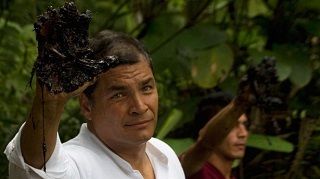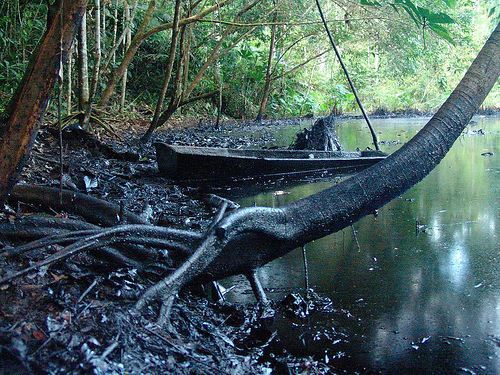Chevron Will Not Clean Up Ecuador Anytime Soon

Chevron, the U.S.’s second-largest oil company after Exxon Mobil, employees a bottomless pit of the world’s most talented lawyers, on which it’s invested over $2 billion in fees in its quest thus far. And they can’t complain about what they’ve gotten in return; the legal team has shown great cleverness in its maneuvers, breaking new ground in efforts to suppress free speech, attacking critics, and investing millions to a campaign of retaliation against its own victims.
Apparently, the central problem Chevron’s legal team faces is that the problem still exists. As we sit here today, 18 years after Chevron began its defense, there is still a great deal of physical evidence regarding the company’s (then operating as Texaco) creating close to a thousand toxic waste pits over an area the size of Rhode Island, affecting 30,000 people and creating a death toll that has already crossed well over a thousand lives (and is expected to cause up to 10,000 more).
It’s hard to pick out a single aspect of Chevron’s actions here that stands out as most outrageous and despicable. If I were forced to choose one, however, I would guess it would be that the company’s leaders premeditated to commit an atrocity in a part of the world populated with men, women and children in whom “civilization” simply has no interest. The people of the entire region are invisible; they do not matter. If the executive team had perpetrated the same thing in the U.S., those responsible would have gone to prison—and they knew it. We have clear laws in place, and a judicial system that does manage to lock up an occasional CEO or two for gross violations. So the folks in charge thought they would make generous profits by destroying a remote part of the world, and its forgotten people—all with total impunity.
As I wrote in 2013:
I normally don’t bet against my own longevity, but it seems extremely unlikely that I’ll still be on this planet when the case against Chevron in Ecuador is finalized and the damages are paid. Here’s an article that explains Chevron’s latest tactic to avoid justice, and overturn the judgment against it, in which the international courts have ruled that the oil company must pay reparations to the people whose land–and health–was ruined by arguably the largest and most blatantly deliberate environmental crime in the history of humankind.
I base my remark about my mortality on the case study of the Exxon Valdez, which occurred in 1986. Exxon Mobil finally settled the case just a few years ago, by which time some 8000 claimants had died, mostly of natural causes, before they received the restitution they were due, in the intervening decades as Exxon dragged the case out as long as possible. There’s no reason to think that Chevron won’t take the same tack.
One group of people that is definitely NOT going away is Amazon Watch, whose effort to preserve what’s left of the Amazon rain forest and to bring environmental and social justice to the region is a true inspiration.

